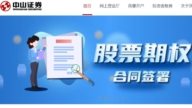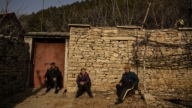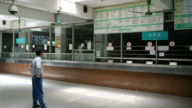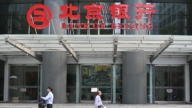【新唐人2013年09月26日讯】大陆中秋刚过,本周踏入9月季末,而下周又是“十一”长假,市场资金再现紧张。为缓解市场资金压力,中共央行24号“放水”,展开6天期的880亿元的逆回购,以逃避“钱荒”重演。另外,一二线城市房市从8月份起成交量回升,楼价飙涨不下,银行信贷却急踩刹车,全线收紧,究竟是什么原因?中国的钱荒真的结束了吗?我们来看专家的分析。
为应对“十一”假期的到来,24号,央行将常规7天期逆回购操作改为6天期,开展了880亿元的逆回购操作,这是自7月底重启逆回购的8周以来,最大单笔逆回购操作。
有分析人士认为,央行担心6月钱荒再度重演,希望透过短期逆回购充分保持市场流动性,体现央行“节前放水消解市场恐慌”用意。
中国人民大学行政管理学研究所所长,北大政治学博士毛寿龙表示,中国各地地方债务长期占款多,并且以新债抵旧债的形式回圈;而楼市贷款大,贷款资金又不能及时回笼回收。
中国人民大学行政管理学研究所所长毛寿龙:“尤其是银行,本身的资金池运作,就是用个人的存款、尤其是活期存款,形成的资金链,去进行贷款这样的目录以外的一些活动、监管以外的一些活动,这个领域它的进的利息比较低,出的利息比较高,但它风险比较大,尤其到假期来临,是一根导火线,很多人会拿钱去用,它可能让这个资金情况在短期里面就暴露出来,那个钱荒也可以这么说”。
香港《经济日报》引述《经济通通讯社24号专讯》指称,“十一”长假前上海银行间同业拆放利率仍高,一个月期拆息超过6%,金融股领跌指数,银行、券商全面下挫。同业拆放利率是指银行同业之间的短期资金借贷利率。
毛寿龙分析,银行资金紧张会导致短期利率的上升。
毛寿龙:“利率一旦上升,大家就对金融没有信心,有些地方就会有挤兑,尤其像养老金这些领域。”
另外,据银行业内人士透露,从中秋节前一周开始,口头接到分行通知,暂停接受包括房屋类首套、二套贷款、消费类贷款、经营类贷款的审批。
大陆媒体报导,日前北京广州等楼市开盘当天即被售罄,频频出现“日光碟”。据中原集团研究中心《新建住宅市场月报》显示,一线城市新房市场在今年7月经历了成交量普跌后,8月成交量强势回归,累计成交量较7月增加15.4%。三四线城市成交量环比增长6.8%。
这么火爆的楼市,为什么急刹房贷呢?
美国南卡罗莱纳大学艾肯商学院教授谢田分析,大陆银行停止放贷一是出于自己贷款业务风险的考虑,同时也看到国有银行自身在闹钱荒,害怕中共总理李克强对那些国有银行和国有房地产企业釜底抽薪,造成未来现金流出问题。
美国南卡罗莱纳大学艾肯商学院教授谢田:“对银行来讲,一些中国银行它实际上比任何人都清楚它们面临的风险在哪里,它们实际上非常清楚的知道房地产泡沫的风险,但是它们有自己的利益在里边,有动机、有个人自己自私的理由希望这个泡沫继续的生长、继续的增长。”
谢田表示,国有银行的钱荒最终一定会导致它们紧缩银根,收紧放贷,一旦这些贷款、房地产投资收紧,房地产市场必然无法支撑,这对所有人来说都是提心吊胆的时刻。
毛寿龙指出,所谓的钱荒其实是金融危机的另外一个代名词。
采访编辑/易如 后制/黎安安
Alert – Cash Running Low as October Holiday Approaches.
Anchor :
After the Mid-Autumn Festival, it’s the last week of
September and China will have the October Holiday
in the following week. But cash runs low in the markets again.
To ease the cash squeeze, China Central Bank injected funds
on September 24, and launched a six-day reverse repurchase
agreement (repos) which is 88 billion RMB in total.
In addition, the housing market turnover rose from August
in the first and second tiers cities, and property prices
continue to soar very high.
The banks are suddenly putting the brakes on, all across the board.
What’s the reason behind the cash flow shortage? Is the cash shortage
ended? Let’s see the report!
Reporter:
To anticipate the upcoming October Holiday, China Central
Bank changed the routine seven-day repos into six-day on
September 24 and launched 88 billion RMB’s purchasing.
This is the biggest repos in 8 weeks since it restarted
the repos at the end of July.
Some analysts believed that China Central Bank is worried
that the cash shortage will happen again, and has acted to
maintain sufficient liquidity in the market.
This is the intention of the Central Bank’s approach:
“Inject funds to solve cash squeeze before the holiday".
Mao Shoulong is Director of the Institute of Administrative
Sciences, China People’s University and a political PhD.
of Peking University.
He said that the debts of China’s Local Governments is absorbing
the funds, and the governments apply for new debts to pay
for the old ones.
Also, the debts in the housing market are huge and the funds
cannot be circulated and recycled in time.
Mao Shoulong, Director of the Institute of Administrative
Sciences, China People’s University:
“Particularly the administration of the pool of funds: the bank
is using individual deposits, especially the demand deposits to
create a capital chain that can be used for investment in
activities which is not a loan and does not need supervision.
In this scenario, the interest on debt is low but the interest
on credit is high although the risk is very high.
In the holiday season, many individuals will withdraw their cash
which exposes the cash shortage. This is the reason for the cash
shortage happening in China."
The Hong Kong “Economic Daily" quoted “the 24th News
Flash of Economic News Agency":
Reported that the monthly interests among Shanghai Banking
industrial is very high before this October Holiday, which is over 6%.
The financial stocks are leading the falling index, the stocks of
the banks and securities are falling overall. Interbank offered rate
refers to the interbank lending rates for short-term funds.
Mao Shoulong analyzed that the cash shortage of the banks
will lead to a short-term interests rise.
Mao Shoulong:"Once the interest rate rises, people will
lose confidence in the economy. In some places, there will
be squeezes, particularly in such fields like pensions."
In addition, according to an insider of the banking industry:
the banking industry had been rumored one week before the
Mid-Autumn Festival that it has suspended new and
second-hand housing loans, consumer loans and
business type loans.
China media reported, that recently many new housing
projects were sold out in the opening day in Beijing,
Guangzhou and other cities.
“One Day Sold Project" is happened frequently. According to
the “New Housing Market Monthly Report"by Central Plains
Research Center Group:
The first-tier cities, experienced an overall decrease in July.
Trading increased dramatically in August. The cumulative trading
volume increased by 15.4% compared with July.
In the third and fourth tier cities, the cumulative trading volume
increased by 6.8%.
The housing market is so hot,
why suspend the housing loans so suddenly?
Xie Tian, Professor at University of South Carolina-Aiken,
analyzed the reasons why Chinese banks suspended
the loans:
It’s based on the loan risks and cash shortage in state-owned
banks. They are afraid that Li Keqiang, the Chinese Premier will
suspend support from the state-owned banks and state-
owned real estate companies.
This will lead to problems in their future cash flow.
Xie Tian, Professor at University of South Carolina-Aiken:
“For banks, in fact some Chinese banks know exactly
where their risks lie, more than others.
They are very clear about the risks of the real estate bubble.
But they have their insider perks, and hope that the
bubble keeps on growing for their own interests and their
selfish reasons."
Xie Tian said that the cash shortage of the state-owned banks
will finally lead to them tightening cash flow, and tighten up
the loan control.
Once these loans and investments are restricted, the housing
boom will definitely lose support.
And that is the scariest time for everybody.
Mao Shoulong also pointed out that the so-called
cash shortage is another name for financial crisis.




























